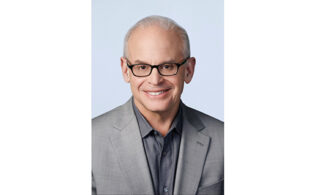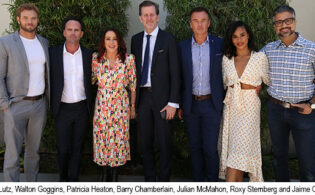Can a head-scratcher of a drama called Evil (from The Good Wife/Fight duo Robert and Michelle King), a hip Batwoman with a lesbian lead character, another Dick Wolf procedural (there is always one from him, of course), or Chuck Lorre’s latest comedy, Bob Hearts Abishola, fill the holes soon to open up on foreign TV grids?
With The Big Bang Theory, Game of Thrones and Jane the Virgin coming to an end this season and several other best-selling series abroad (Modern Family, among them) approaching their final runs, some three-dozen newcomer pilots will vie to become the next big hit on TV platforms around the globe.
As the week-long L.A. Screenings here in Hollywood kicks into gear this weekend, however, key foreign buyers are expected to be “painstakingly picky,” in the words of one of them, in making their program selections. That’s because they, too, are producing most of their own prime-time fare, and relegating American shows to the sidelines. If, say, 15 years ago a dozen out of the top 20 prime-time series in Europe were made in the U.S., today only two or three American series enjoy high-profile time slots there.
This new normal means that revenues raked in by the major Hollywood program suppliers from their sales to TV outlets abroad are, at best, inching up on an annual basis, at a time when outlays to talent (yes, to YOU, top showrunners!) are on a steep rise. Upwards of $1.2 billion has been showered on a clutch of uber-producers in the last year, several being thereby lured to digital competitors, others being recompensed to remain tethered to one or another studio lot.
And yet. Overseas buyers still flock en masse to Tinseltown every May, even if they’re generally buying less and trying to hold the line on price increases.
Queried by World Screen over the last month, several acquirers claimed they (and their viewers) want “a classy drama,” or “a smart comedy,” or “a different kind of show that will have everyone talking,” but the emphasis these days is on the “a.” They no longer want to buy in bulk from their U.S. suppliers; rather, like the handful of top British buyers have always done, they increasingly cherry-pick the one, or two, or three shows that will make a positive impact on their platforms back home.
Top sellers in Hollywood are acutely aware of the changing global landscape. “The appetite for American programming has changed at the same time the volume of programming has gone up.”
That’s how Jeffrey Schlesinger, the president of Warner Bros. Worldwide Television Distribution (now representing U.S. Turner originals and HBO Enterprises content, in addition to Warner Bros.’s prolific output), summed up the current supply/demand dynamic. His phrase also suggests the challenge for the major studios—to keep the wheels of their production machines turning smoothly while doubling down to make up their deficits from, what’s called in the biz, “foreign.”
Warner Bros. has for the past two decades been the most prolific provider of primetime dramas and comedies for the U.S. networks, despite being aligned as a co-owner (alongside CBS) of just the smallest, The CW. In what may be a calculated—or simply fortuitous?—response to the changing marketplace, Warner Bros. this time around is fielding just five new broadcast series contenders.
The estimated 1,200 TV program buyers who show up from around the world will spend most of their time over the next week scouring the three-dozen scripted shows just greenlit by the five broadcast U.S. networks, almost all of which to be licensed by the aforementioned Warner Bros., Disney, NBCUniversal, CBS Studios International or Sony Pictures TV. Increasingly, they’ll likely not conclude deals until later in the summer or even as late as November when ratings performances Stateside become clear.
An unspecified number of overseas program buyers managed to catch the broadcast Upfront presentations for advertisers this week in New York City before they head to the West Coast for the viewing marathon (May 18 to 24). World Screen spoke with a handful to get their first impressions. One provided a seemingly off-the-cuff rundown of the different networks’ presentations: “Being ranked number one, NBC touted stability, FOX vowed to be scrappy, ABC played it safe with its now huge portfolio, The CW aims to stay forever young, and CBS is going comedy-crazy.”
Among the drama clips that stuck in these buyers’ minds were an AI-inflected mystery called neXt starring John Slattery for the FOX network (created by 24: Legacy producer Manny Coto and licensed by Walt Disney Global Content Sales), a thriller called Emergence for ABC (also licensed by Disney), and over at NBC an ensemble drama led by Jimmy Smits called Bluff City Law, which has landed the plum 10 p.m. Monday slot.
Because of vertical integration, the bulk of each U.S. network’s IP is now sourced from their respective sibling production studios and licensed abroad by their distribution units. Non-aligned independents that have scored pickups include Sony Pictures Television, with four new midseason shows—the dramas For Life on ABC and Lincoln on NBC, and the comedies United We Fall for ABC and Indebted on NBC—Lionsgate, which secured a berth for a musical dramedy, Zoey’s Extraordinary Playlist, on NBC; and Entertainment One, which managed a slot for a contemporary cop show on FOX called Deputy, in which the new sheriff channels his inner cowboy.
If any of these hopefuls gather heat at the Screenings, however, there could be competitive bidding in one territory or another. That happened when Desperate Housewives and Lost wowed the overseas crowd in 2004 and again in 2009 when Glee and Modern Family were hotly contested. Such exuberance is not likely nowadays, as there are many niggling details for buyers to go over before signing on the dotted line and many hoops that have to be jumped through. Buyers tend to want multiple rights and various exclusivities for their own platforms back home; U.S. sellers increasingly demand hold-backs, non-exclusive arrangements, and shorter-term deals, especially now that they plan to launch their own direct-to-consumer streaming services.
Plus, a top drama, still the most sought-after asset by overseas programmers, can cost several hundred thousand dollars per episode in any given top-five foreign territory: a lot of business affairs folks and legal eagles are in the mix on both the seller and the buyer side to cobble together these deals.
“Only first-time Screenings attendees get openly giddy about a new show,” another acquisitions executive told World Screen. “It’s better for us to remain phlegmatic if I’m using that English word correctly.”
There are other considerations to weigh at this edition of the Screenings that make it trickier than past iterations.
Overseas buyers are keenly aware of, if not anxious about, the fact that the American entertainment industry has reached an inflection point, one as discombobulating as that one 20 years ago when AOL swallowed whole (and later regurgitated) Time Warner and Viacom wrested CBS from Westinghouse, sending shock waves through the biz and eventually realigning the major players on the scene.
For one thing, the biggest U.S. program providers are nowadays hatching plans to unleash their own streaming services to take on digital dynamos like Netflix, Amazon and Apple domestically and around the world. Those efforts will mean that some—it’s unclear in each case how much—original U.S. content will be held back to prime the pump of these new streamers, and not made available to foreign buyers. If not at this Screenings go-round, then certainly within the next 12 months this new twist to things will be felt.
“Keep in mind,” Schlesinger points out, “that these streamers won’t roll out all at once and when they do, they’ll do so in different patterns and places, and with different approaches.” (Disney, for example, has already announced a November launch domestically for Disney+; CBS, too, has already planted a flag via its All Access service; Comcast is mulling an ad-supported rather than a subscription service.)
Per the Warner Bros. distribution chieftain, parent WarnerMedia too has “ambitious” plans. “We’ll have new original programming [for the platform], though in some cases we’ll still be selling content to third parties, while in other cases, we’ll be retaining rights. The point is that the buyer/seller relationship is complex: the buyer wants a particular grant of rights; the seller wants some restrictions in place to preserve flexibility,” Schlesinger emphasized. (Randall L. Stephenson, chairman, CEO and president of AT&T, discussed WarnerMedia’s upcoming video platform, at the J.P. Morgan Global Technology, Media and Communications Conference in Boston this week.)
Even before these streaming efforts get underway, overseas buyers will likely have calculated that three suppliers now control roughly two-thirds of what gets made Stateside and licensed abroad: WarnerMedia, the new Disney-Fox combo, and Comcast, this last the parent company of NBCUniversal’s various production units and new owner of Sky in Europe.
“Like, seemingly overnight,” as one veteran buyer put it to World Screen, one entire major studio, (as in Fox), has been subsumed within the Disney fold, essentially taking a key seller out of the Screenings mix. Henceforth, Disney will handle sales of all content produced by the former Rupert Murdoch-owned entertainment studio. Apparently caught up in all the complications the absorption of Fox involves, Disney is not hosting its opening night International Upfronts shindig, which for 15 years has kicked off the Screenings marathon.
Further, as a result of AT&T’s acquisition of Time Warner and its rebranding as WarnerMedia, two of that conglomerate’s other sales units, those of HBO and basic cabler Turner, will now coalesce under the Warner Bros. TV distribution banner headed up by Schlesinger. Whether program buyers find these changes positive, creating greater efficiencies and fewer providers to deal with, or worrying because it reduces their leverage, remains to be seen.
“It’s very early stages [in figuring out] structure, manpower needs and support services in regards to incorporating Turner and HBO operations,” Schlesinger said, but the good news, he added, is that “we will be able to speak with one coordinated voice whereas before we were in silos.” He extolled the quality and range of product from these additional sources, suggesting that his group would now be better able “to match the right product to the right platform.”
In any case, HBO will still host its own Screenings session on Sunday, May 19, at which longtime SVP Jennifer Bowen will preside but which will be closed to the press. Lionsgate is also hosting its sessions for buyers on Sunday under its new international distribution chieftain, Agapy Kapouranis, but has also declined to allow press to attend.
And to the extent that there is still truth to the adage that “international TV is a relationship business,” there will be many new ones to forge during and in the wake of this Screenings event. Most notably for buyers, with Janice Marinelli, a longtime home entertainment and syndication executive at Disney, who was recently promoted to president of global content sales and distribution. She now manages the largest program portfolio in the business, and reports to Kevin Mayer, the chairman of Disney’s direct-to-consumer and international division, himself in his new role for little more than a year.
Conjuring Disney’s $71 billion deal for Fox, its streaming initiative Disney+ and its just-announced operational control of Hulu, Mayer told the Upfront audience Tuesday in New York: “This [event] marks the latest watershed event in what has been a remarkable year for us.” An understatement if ever there were one.
Visit WorldScreen.com’s Fall Season Grid for all the details on the new and returning shows on the U.S. broadcast networks, and a listing of pickups by studio.




